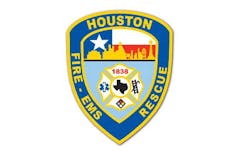'Day of Reckoning' for Houston Firefighters
Nov. 29—More than four years after Houston voters approved a measure that would grant firefighters equal pay with police officers, the legal battle to decide the referendum's fate is headed to the Texas Supreme Court.
The state's highest court will hear oral arguments Tuesday morning regarding Proposition B, the charter amendment pushed by the firefighters' union and approved by voters in 2018. It would grant firefighters pay parity with police officers of a similar rank and seniority. The Supreme Court also will hear arguments in a similar case that stems from the city and union's preceding contract stalemate.
Its rulings on those cases, not expected Tuesday, likely will have drastic consequences for the city's roughly 3,900 firefighters, the annual City Hall budget and next year's city elections.
The firefighters' union has billed Tuesday's hearing as "the day of reckoning" that will expose the city's conflicting arguments in the two cases. In the end, the union hopes, the high court will uphold the will of voters from 2018.
"The vote of the people is a sacred thing, yet the city has shown no respect for it, spending millions in taxpayer money over the years on these two cases," said Marty Lancton, president of the Houston Professional Fire Fighters Association. "Now, there is nowhere else for them to turn or hide. We are confident in the law and more than ready to make our case before the state's highest court."
Meanwhile, Mayor Sylvester Turner and his administration have argued that the costs of implementing the pay parity measure — which could run to hundreds of millions of dollars — would be financially ruinous to the city.
"If Houston does not prevail in the Prop B case, the significant financial burden will threaten the city's finances and its ability to deliver services," City Attorney Arturo Michel said. "It will force significant structural changes to the fire department, and will result in a reduction of personnel from departments across the city, including police and fire."
BACKGROUND: Before Prop B was struck down, Houston issued layoff notices to 220 firefighters
The long-running legal dispute has its roots in a contract stalemate dating back to 2017, when the latest contract between the city and firefighters expired. The two sides were unable to agree on a new one after negotiations and mediation, and they have been locked in contentious court battles since.
Shortly after voters passed the pay parity measure by a 59-to-41 margin in 2018, the police union and city challenged the charter amendment in court. They won a trial judge's ruling in 2019 that the measure violated the Texas Constitution by superseding the state law that governs how to pay firefighters. An appeals court overturned that ruling last summer. The city has not implemented the measure, although City Council has given firefighters 6 percent raises in each of the last two budgets, with a promise to do so again next year.
The Prop B case centers on this question: Do the standards for firefighter pay enshrined in state law preempt a new, local standard introduced by the charter amendment? State law calls for paying firefighters substantially equal to their counterparts in private sector employment. Prop B calls for paying them at least equally to their counterparts in police.
The city and police union have argued that standard quashes the one enacted by the state, and therefore it violates a clause in the Texas Constitution that says cities cannot pass ordinances that are inconsistent with state laws.
The 14th Court of Appeals, however, said they can coexist. Justice Meagan Hassan wrote that the courts only are supposed to strike down local laws when they are unmistakably preempted by state law. And the charter amendment's adoption of a new standard for pay, she wrote, merely establishes a "compensation floor" for firefighters. The state standards, which compare pay to private employment, can "further determine fire fighter compensation to the extent it exceeds that floor." Since the laws do not always exist in conflict, Hassan wrote, Prop B can live.
In a dissenting opinion, Justice Ken Wise said the hypothetical scenario is not borne out in reality. The current situation, he said, is that "these two standards are not currently equivalent," and he said Prop B should be struck down. The city and police union hope the Supreme Court will adopt his logic.
The fire union believes it has another advantage: the city, it says, is arguing against itself. The Prop B case has been consolidated in arguments with a separate case about the union's pay dispute with the city, originally filed before Prop B was adopted.
After the two sides reached an impasse, the firefighters filed a suit in district court to resolve the dispute, using a process laid out in the state law. In it, the union argued the city was failing to meet its statutory requirement to pay firefighters in a way that is comparable to private sector employees.
The city has argued, in response, by challenging two key tenets of the state's collective bargaining law: the comparable standard of private sector employment, and the judicial enforcement mechanism the fire union is using. City attorneys argue both are unconstitutional because they delegate a legislative function to a court and fail to provide sufficient standards to guide its discretion.
In one case, the city is arguing Prop B violates the state's private employment standard. In another, it argues that standard is unconstitutional. On Tuesday, the union says, lawyers for the city will have to argue both points in one setting.
___
(c)2022 the Houston Chronicle
Visit the Houston Chronicle at www.chron.com
Distributed by Tribune Content Agency, LLC.
